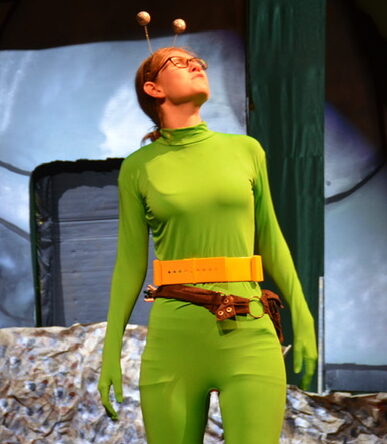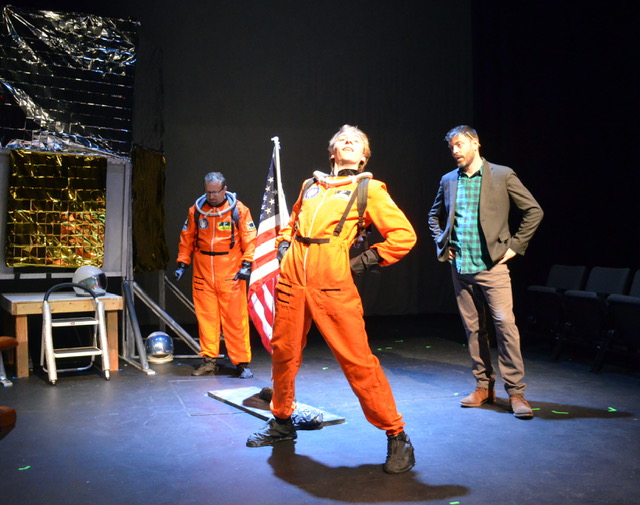By Joseph Szalinski
Like many thrifty Yinzers I know, I can’t pass up a good deal. Especially one that’s out of this world. And that’s exactly what The Jesters’ Guild is offering at Duquesne University’s Genesius Theater with their latest production, The Space Program, which is comprised of two shorter plays that both deal with the cosmos in some capacity.
The first of the two shows, “We Never Went to the Moon,” is a farcical look at legendary director Stanley Kubrick’s (Brandon Donaldson) rumored involvement in staging the 1969 moon landing. He’s joined onstage by a self-obsessed Neil Armstrong (Elijah Corbin), a conflicted Buzz Aldrin (Todd Foose), an eager stagehand (Jeff Britt), and a controlling studio executive (Sydney Turnwald). Playwright/director, Derek Lynch, crafts an engaging piece of theatre that provokes laughter and thought throughout its runtime.
“We’ve Always Been on Earth,” playwright/director Jeremiah Ion’s amusing take on the UFO crash in Roswell, New Mexico in 1947, pits Pip (Corbin), Zoldak (Turnwald), and Captain Bildar (Foose) against a curious Mac Brazel (Britt) and suspicious Jesse Marcel (Donaldson). Replete with hijinks, references, and the like, this story brings the necessary energy and wit to the production for it to finish playing out as strongly as it does.
Brandon Donaldson is terrific in his dual roles. While Jesse Marcel isn’t as prominent as the other characters in Act 2, he does add to the dynamic wonderfully. It’s Donaldson’s Kubrick, though, that really shines. Or in this case, reflects. His performance explores Kubrick’s fallibilities, invented or otherwise, helping to show a man more concerned with making a good movie versus filming scientifically accurate footage that could dupe the public.
Elijah Corbin is hilarious as Neil Armstrong and Pip. He possesses a zany zeal that helps his characters be as endearing as they are ridiculous. Of the two, it’s Corbin’s iteration of the famous astronaut that showcases his strengths. He masterfully lampoons Neil’s pioneering image and legacy, demonstrating an egotistical space cadet who hasn’t had the benefit of being heroized by history.
Todd Foose brilliantly juggles the requirements of his two characters, Buzz Aldrin, and Captain Bildar. Although both are comfortable in their respective knowledge and experience, Aldrin’s conscience makes him somewhat of a comedic foil, whereas Captain Bildar more easily succumbs to the wackiness that he and his crew are embroiled in.
Sydney Turnwald is marvelous in her two portrayals. As the studio executive, she’s a little more reserved and calculated, interjecting with a great line at the right time. However, it’s her turn as Zoldak that really demonstrates her abilities. Not only does she have more stage time, but she also has a little more to work with as a character—allowing her to plumb the depths of her dimensionality, effortlessly bouncing between being a level-headed crew member and the uncertainty that comes with being stranded on an alien world.
Jeff Britt steals the show as both the stagehand and Mac Brazel. His animated goofiness allows him to simultaneously stand out but still complement the ongoing scene and his scene partners. His introductions induce chuckles, and every subsequent appearance builds upon it, assisting the audience in getting carried away with the delightful absurdity of it all.
Set design was minimal yet effective. Act 1’s moon lander and act 2’s crash site help establish their respective scenes but leave enough room for the performances to retain the focus. The costumes were marvelously inventive; the standout pieces were the silver painted 2-liters as oxygen tanks and the backwards baseball cap adorned with springy antennae. In combination with the lighting and sound, the costumes and props and other stage paraphernalia do a great job of transporting the audience into their worlds, with any modicum of hokeyness adding to the overall charm and appeal. Even the program is as fun as it is exhaustive.
One of my favorite things about this production is its cohesiveness. Being written, produced, directed, and overseen by the Jesters, with additional technical assistance, enables the production to seem like a unified piece of art in a way that a lot of plays can’t. Every element of this production perfectly showcases the joy of putting on a show for people and being able to realize an artistic vision. Granted, it is really well done, but most importantly, you can tell that everyone involved has an absolute blast bringing it all to life.
-JS
The Space Program continues its run June 23rd-25th at Duquesne University’s Genesius Theater. For more information, click here.




Really enjoyed the show…great everything..